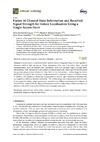Identificador persistente para citar o vincular este elemento:
https://accedacris.ulpgc.es/jspui/handle/10553/73634
| Título: | Fusion of channel state information and received signal strength for indoor localization using a single access point | Autores/as: | Sánchez-Rodríguez, David Quintana-Suárez, Miguel A. Alonso-González, Itziar Ley-Bosch, Carlos Sánchez-Medina, Javier J. |
Clasificación UNESCO: | 120304 Inteligencia artificial | Palabras clave: | Amplitude processing Channel state information Features fusion Fingerprinting Indoor localization, et al. |
Fecha de publicación: | 2020 | Proyectos: | Enruta: Entorno de Localización de Alta Precisión Para Un Turismo Accesible Sistema de Localización Aplicado A Personas Con Diversidad Funcional. Posicionamiento y Predicción de Intenciones. |
Publicación seriada: | Remote Sensing | Resumen: | In recent years, indoor localization systems based on fingerprinting have had significant advances yielding high accuracies. Those approaches often use information about channel communication, such as channel state information (CSI) and received signal strength (RSS). Nevertheless, these features have always been employed separately. Although CSI provides more fine-grained physical layer information than RSS, in this manuscript, a methodology for indoor localization fusing both features from a single access point is proposed to provide a better accuracy. In addition, CSI amplitude information is processed to remove high variability information that can negatively influence location estimation. The methodology was implemented and validated in two scenarios using a single access point located in two different positions and configured in 2.4 and 5 GHz frequency bands. The experiments show that the methodology yields an average error distance of about 0.1 m using the 5 GHz band and a single access point. | URI: | https://accedacris.ulpgc.es/handle/10553/73634 | ISSN: | 2072-4292 | DOI: | 10.3390/rs12121995 | Fuente: | Remote Sensing [EISSN 2072-4292], v. 12 (12), (Junio 2020) |
| Colección: | Artículos |
Citas SCOPUSTM
14
actualizado el 08-jun-2025
Citas de WEB OF SCIENCETM
Citations
14
actualizado el 22-feb-2026
Visitas 5
120
actualizado el 10-ene-2026
Descargas
80
actualizado el 10-ene-2026
Google ScholarTM
Verifica
Altmetric
Comparte
Exporta metadatos
Los elementos en ULPGC accedaCRIS están protegidos por derechos de autor con todos los derechos reservados, a menos que se indique lo contrario.
